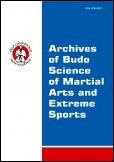2023, Volume 19, Issue 1
Some methodological and organisational dilemmas of implementing simulation diagnostic methods based on mixed assessments in defence education – empirical arguments
Ryszard Kałużny1
1General Tadeusz Kościuszko Military University of Land Forces, Wroclaw, Poland
Author for correspondence: Ryszard Kałużny; General Tadeusz Kościuszko Military University of Land Forces, Wroclaw, Poland; email: ryszard_kaluzny@op.pl
Full text
Abstract
Background & Study Aim: Tadeusz Kotarbiński defined 'struggle' in a broad sense as any activity that is at least a two-subject one (premising that a team can be a subject) where at least one of subjects hinders the other. He also formulated the most general directive of necessary defence, which can be applied to any level of action: To fight, if it is necessary to fight in defence of the nearer among fellow men (...) Hating no one and sparing the adversary every misfortune unnecessary for victories, and immediately showing him full active benevolence the moment fighting is no longer necessary". The main cognitive objective of the research is empirically verified knowledge of the preferred modes of action in different situations of simulated physical aggression, by candidates applying for studies with different military profiles.
Material & Methods: The research was conducted in 2019 with candidates to study at Polish military universities with two profiles (land forces and medical service). A random selection (purposive sampling) was made from secondary school graduates. The single criterion for inclusion in the study was met - interest (without detailing the motives) in this type of study. The only exclusion criterion was the lack of due diligence in filling in the questionnaire. Therefore, 309 questionnaires were qualified for analysis (14 did not meet the criterion of due diligence). In the current research (using the KK’017 questionnaire based on mixed assessments: ‘efficiency – ethical’) I am analysing the results of two simulations, partly modified. First simulation: ‘the purpose of physical aggression against the respondent is not clear’; Second simulation: ‘the purpose of physical aggression directed at a person unknown to the respondent is not clear’ (but in the presence of the respondent).
Results: The profile of the secondary school completed differentiates statistically significantly (p<0.01) only between graduates of military classes and vocational secondary schools. When simulated aggression, in the presence of the respondent, is directed at an unknown person, candidates for military studies with a command profile are more willing, at the level of statistical significance (p<0.01), to act effectively and ethically than those preferring a medical profile. The only predictor of the suitability of military candidates, precisely because of their expected mode of action in situations of physical aggression, is a completed secondary school with a military profile.
Conclusions: I consider the review of publications reporting on the results concerning the diagnosis of the two phenomena (aggressiveness and bravery) using the INNOAGON tools discussed above to be the first research challenge to put the already accumulated knowledge in order (especially as many works are published only in Polish). Conducting research in parallel using the available tools to simulate these phenomena is an opportunity to provide even more, reliable, attractive and more modern tools for diagnosing and reducing aggressiveness in people of all ages. In order to apply these INNOAGON tools in a complementary way (and therefore also based on physical effort), the professional competence of a psychologist or educator in the traditional sense of these qualifications is not sufficient.
Key words: aggression, aggressiveness, bravery, INNOAGON





